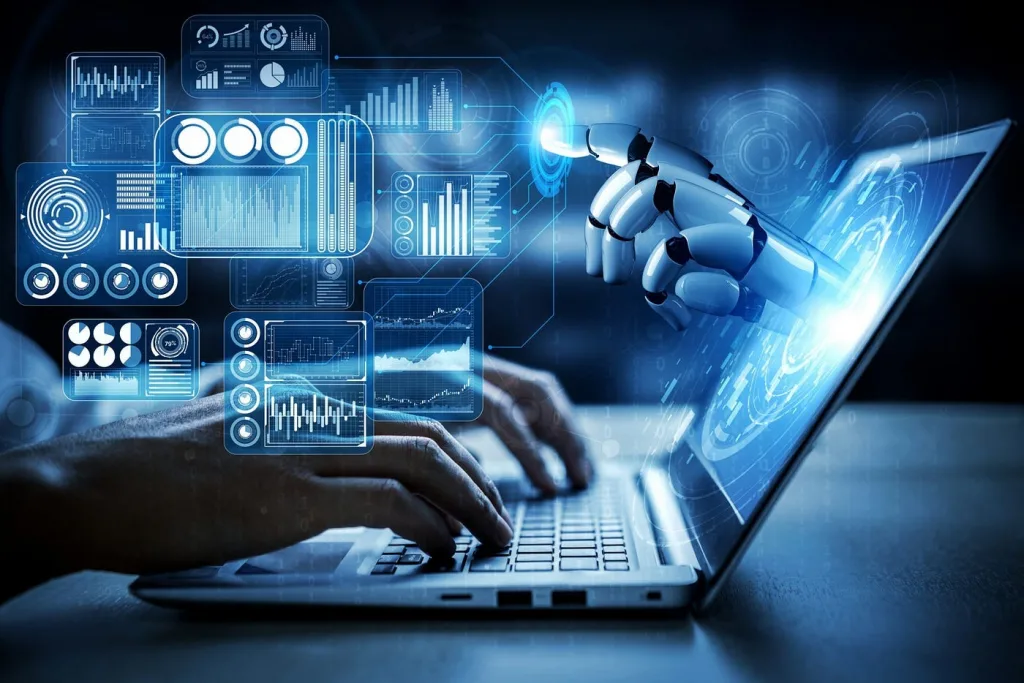Challenges & Opportunities of AI Software
In today’s digital age, the demand for AI software is increasing due to its ability to enhance workflows and boost business performance. AI software, or artificial intelligence software, can learn from data, adapt to new situations, and make intelligent decisions without human intervention. So, what exactly is AI software?
AI Software is software that uses Artificial Intelligence (AI) to perform intelligent tasks that usually require human intelligence. AI software has the capability to learn, adapt, and make decisions based on data. This rapidly evolving field is having a profound impact on various aspects of life and work.

WHAT ARE THE FUNCTIONS OF AI SOFTWARE?
AI software encompasses a wide range of functions designed to enhance efficiency and decision-making.
Data Analysis
AI software can process and analyze large amounts of data quickly and accurately. By using machine learning algorithms, AI can identify patterns and trends that manual analysis might miss, helping businesses gain crucial insights to make informed decisions.
Automation
AI can automate repetitive and time-consuming tasks, freeing up human resources for more complex activities. For example, AI can automatically handle customer support requests, manage inventory, or even schedule work tasks, reducing the burden on employees and increasing operational efficiency.
Predictive Analytics
With the ability to predict future trends based on historical data, AI helps businesses make smarter decisions. By analyzing factors affecting the market and consumer behavior, AI can forecast sales, product demand, and even financial risks, enabling businesses to strategically plan more effectively.
Natural Language Processing (NLP)
NLP technology allows AI to understand and respond to human language naturally. This supports functions like chatbots and virtual assistants, providing 24/7 customer service, processing requests, and answering customer queries quickly and efficiently.
Image and Voice Recognition
AI software can recognize and understand image and audio information, which is useful in a variety of applications from security to customer service. For example, AI can analyze images from security cameras to detect and alert about suspicious activities, or recognize voices to provide support over the phone.
Personalization
AI can customize user experiences by learning individual preferences and behaviors. This helps deliver personalized product or service recommendations, improving customer satisfaction and engagement, and enhancing marketing effectiveness.
Problem Solving
AI can help solve complex problems by simulating scenarios and evaluating feasible solutions. This is particularly useful in fields like healthcare, finance, and risk management, where making the right decisions promptly is crucial.
AI software offers numerous opportunities and significant benefits for businesses, but it also requires careful preparation and a comprehensive strategy to overcome challenges.

CHALLENGES & OPPORTUNITIES OF AI SOFTWARE
Challenges of AI Software
- High Initial Investment Cost: Implementing AI software requires significant financial investment, including costs for hardware, software, and specialized personnel. This can be a major barrier for small and medium-sized enterprises.
- Lack of Quality Data: AI software performs best when provided with large quantities of high-quality data to learn from. However, not all businesses have suitable and sufficiently large data available. Poor quality data can lead to inaccurate or unreliable results.
- Data Security and Privacy Issues: AI software often requires access to large amounts of personal and sensitive data, raising concerns about security and privacy. Businesses must ensure that data collection and usage comply with data protection regulations and implement security measures to prevent data breaches.
- Lack of Knowledge and Expertise: Implementing and managing AI software requires extensive specialized knowledge. Many businesses struggle to find and retain highly qualified personnel in this field. This can slow down AI implementation and reduce the effectiveness of deployed AI solutions.
Opportunities of AI Software
- Optimization of Business Processes: AI software can automate repetitive and complex tasks, helping businesses optimize workflows and improve efficiency. This saves time and reduces operational costs, allowing companies to focus on core activities.
- In-Depth Data Analysis: AI can analyze vast amounts of data with high speed and accuracy, providing businesses with timely and insightful information. This supports data-driven decision-making, improving business strategies and predicting market trends.
- Enhanced Customer Experience: AI can analyze customer behavior and preferences to offer personalized services and products, enhancing customer experience and satisfaction. This helps businesses retain and expand their customer base.
- Development of New Products and Services: AI opens up opportunities for innovation and the development of new products and services. Businesses can use AI for research and development, improving existing products, and creating breakthrough solutions to meet market demands.
- Improved Security: AI can quickly detect and respond to cybersecurity threats, protecting business data and systems. This enhances security and reduces the risk of data breaches and information loss.
In conclusion, AI software presents many opportunities and significant advantages for businesses. However, it demands thorough preparation and a well-rounded strategy to address the challenges it brings. Companies must invest wisely and adopt the right approach to fully leverage this technology’s potential.
TRENDS FOR AI SOFTWARE IN THE FUTURE
Integration of AI Across Industries
AI is increasingly being applied across various sectors such as healthcare, finance, and manufacturing. In healthcare, AI assists with disease diagnosis and personalized treatment. In finance, AI helps detect fraud and optimize investments. In manufacturing, AI automates processes and predicts maintenance needs. This integration not only enhances efficiency but also creates smarter solutions tailored to each industry.
Self-Learning AI
A prominent trend is the development of AI systems that can self-learn from new data without extensive human intervention. AI can identify data patterns, adjust behaviors, and improve performance automatically. This advancement enhances the ability to handle complex tasks and optimize processes with minimal manual adjustments.
Increased Collaboration between Humans and AI
Future AI systems will focus on augmenting human capabilities rather than replacing them. This collaboration will enhance productivity and decision-making by leveraging AI’s analytical power alongside human intuition and creativity.
By partnering with PadiTech, you gain access to expertise that will help you navigate the complexities and challenges of AI software. We provide tailored solutions that address potential hurdles and ensure a smooth implementation. With PadiTech’s support, you can transform challenges into opportunities, driving efficiency and growth for your business while staying ahead in a competitive market.






